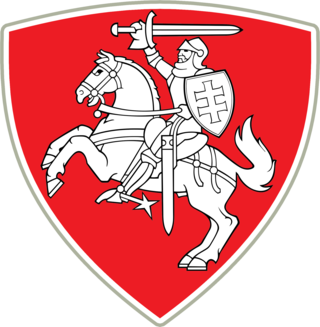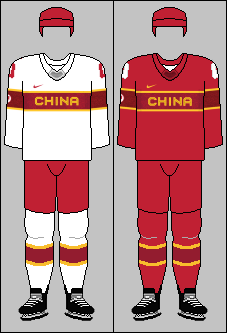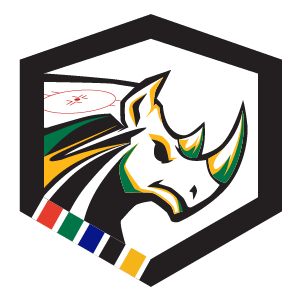
The Belgium men's national ice hockey team is the national men's ice hockey team of Belgium, and has been a member of the International Ice Hockey Federation (IIHF) since 1908. They have played in four Olympic Games, the last in 1936. The team also participated in the European Championships from 1910 to 1932. They have won 2 bronze medals, 1 silver medal (1927), and 1 gold medal (1913).

The Australian men's national ice hockey team represent Australia in the sport of ice hockey under the jurisdiction of Ice Hockey Australia which is a part of the International Ice Hockey Federation (IIHF). Australia competed in the Winter Olympics once, in 1960, when the team lost all of their matches. They have also competed in the Ice Hockey World Championships, 33 times with their best result being a ninth-place finish at the same Olympics with a 13th place in 1962. The national team currently are in division two after being relegated from division one in 2013 with the team being currently ranked 35th in the IIHF World Rankings.
The IIHF World Championship Division II are an annual sports event organized by the International Ice Hockey Federation. The division championships are played in two groups, part of the Ice Hockey World Championships

The Lithuanian national ice hockey team is the national ice hockey team of Lithuania. The team is overseen by Lithuanian Ice Hockey Federation who is a member of the International Ice Hockey Federation (IIHF). Lithuania is ranked 24th in the IIHF World Rankings. They have never competed in Olympic Games.

The Chinese national ice hockey team is the national men's ice hockey team of the People's Republic of China. The team is controlled by the Chinese Ice Hockey Association and a member of the International Ice Hockey Federation (IIHF).

The Japanese national ice hockey team is the national men's ice hockey of Japan. They are controlled by the Japan Ice Hockey Federation and a member of the International Ice Hockey Federation (IIHF). Japan is currently ranked 23rd in the rankings and currently compete in the IIHF World Championship Division I. They have competed in eight Olympic Games competitions.

The Yugoslav national ice hockey team was the national men's ice hockey in the former republic of Yugoslavia. They competed in five Olympic Games competitions. This article discusses the team that represented the Socialist Federal Republic of Yugoslavia and its predecessors, but not the Federal Republic of Yugoslavia. For the FRY, please see the Serbia and Montenegro men's national ice hockey team. The team was largely composed of players from Slovenia: throughout its existence 91% of all players on the national team were Slovene, and the entire roster for the team at the 1984 Winter Olympics, held in Sarajevo were from Slovenia.
The South Korean men's national under 20 ice hockey team is the national under-20 ice hockey team in South Korea. The team represents South Korea at the International Ice Hockey Federation's World Junior Hockey Championship Division II.
The Australian men's national under 20 ice hockey team is the national under-20 ice hockey team of Australia. The team represents Australia at the International Ice Hockey Federation's World Junior Hockey Championship Division III.
The Belgian men's national under 20 ice hockey team is the national under-20 ice hockey team in Belgium. The team represents Belgium at the International Ice Hockey Federation's World Junior Hockey Championship Division II.

The Bulgarian men's national under-20 ice hockey team is the national under-20 ice hockey team of Bulgaria. The team represents Bulgaria at the International Ice Hockey Federation's IIHF World Junior Championship Division III tournament.

The German men's national under 20 ice hockey team is the national under-20 ice hockey team in Germany. The team represents Germany at the International Ice Hockey Federation's IIHF World Junior Championship.

The Hungarian men's national under 20 ice hockey team is the national under-20 ice hockey team in Hungary. The team represents Hungary at the International Ice Hockey Federation's IIHF World U20 Championship.

The Spain men's national junior ice hockey team is the national men's junior under-20 ice hockey team of Spain. The team is controlled by the Federación Española de Deportes de Hielo, a member of the International Ice Hockey Federation.

The Mexican men's national under 20 ice hockey team is the national under-20 ice hockey team in Mexico. The team represents Mexico at the International Ice Hockey Federation's IIHF World U20 Championship.

The Lithuanian men's national under 20 ice hockey team is the national under-20 ice hockey team in Lithuania. The team represents Lithuania at the International Ice Hockey Federation's IIHF World U20 Championship.

The Romania men's national under 20 ice hockey team is the national under-20 ice hockey team of Romania. The team is controlled by the Romanian Ice Hockey Federation, a member of the International Ice Hockey Federation.

The South Africa men's national under-20 ice hockey team is the national under-20 ice hockey team of South Africa. The team is controlled by the South African Ice Hockey Federation and a member of the International Ice Hockey Federation (IIHF).
The South Africa women's national ice hockey team represents South Africa at the International Ice Hockey Federation's IIHF World Women's Championships. The women's national team is controlled by South African Ice Hockey Association. The South African national team is the only national women's ice hockey team on the entire African continent. As of 2012, South Africa has 52 female players. The South Africa women's national team is ranked 32nd in the world.
This article lists the performances of each of the 62 national teams which have made at least one appearance in the Ice Hockey World Championships, an annual international men's ice hockey tournament organized by the International Ice Hockey Federation (IIHF), including the Olympic ice hockey tournament was also considered the World Championship for that year, and was held before the first Ice Hockey World Championship as an individual event in 1930. With the exception between 1940 and 1946, when no championships were held during World War II, nor were held during the Olympic years 1980, 1984, and 1988. In 2020, the IIHF announced that all World Championship tournaments have been cancelled due to the COVID-19 pandemic and travel restrictions-related issues.













